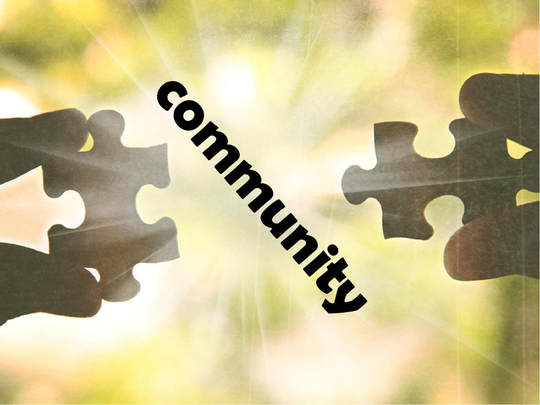This is the fourth installment in a series called "Koinonia." You can read Part 1, Part 2, and Part 3 by clicking on the links. This series is an attempt to understand the forces at work in building community. Polarization is antithetical to koinonia. This blog explores my effort to understand the forces at work in polarization.
In the early months of 2017, I started a project: a presentation on polarization using Bowen Theory as a theoretical approach. The goal of the presentation was to present an emotionally neutral position that explored the underlying emotional processes for polarization. I presented my thinking to community organizations. The first version of the presentation was cutesy. I thought cuteness would make talking about polarization less intense. Over time, and as the presentation evolved, I moved away from cuteness and started to included scientific research and observations.
In each progression of the presentation, I concluded with differentiation of self. People heard my explanation of differentiation as a technique. What they heard was, “This is what you should do about polarization. This is what you shouldn’t do about polarization.” So, the improvements in the presentation were designed to move away from technique towards a focus on thinking.
In May of this year, I presented an updated version of the presentation at the 2nd International Conference of Bowen Theory in Hong Kong. It represented the best version of my thinking after eighteen months of applying Bowen Theory to the process of polarization in the family, the congregation and society. I liked the presentation. But it was that night, after my presentation, that I finally got it!
That night, I had an “aha” moment. It turned out to be an observation I knew better than anything I had presented in the afternoon. It was the result of years of work on differentiation in my family of origin. It’s a curious thing, the way the mind works. I never considered including this observation in the presentation.
Bowen Theory teaches that when anxiety goes up and reaches a certain threshold (which varies from person to person and family to family) anxiety generates reactivity. Humans have two primary ways of reacting to anxiety. One way is to move towards another in an effort to calm down oneself and others. If your spouse is upset about the behavior of a child, you move towards the spouse or the child to calm down the relationship system. Another way we react is to distance. If your sister is yelling at you about what you said to her child, instead of engaging her about the problem, you walk away. In some cases, people walk away for good.
Bowen referred to anxiety as an electrical jolt. As one receives the anxious “jolt” one reacts automatically by either moving towards the other or by distancing. Part of the process of differentiation of self is learning to self-regulate and manage one’s automatic responses to the “jolt.”
That night in Hong Kong, I started thinking about the jolt. I've always thought about it as an issue of time. Seconds, really. When I receive a jolt of anxiety, I absorb it. I don’t react. I don’t pass it along. I let the energy diminish. It takes a few seconds. Then I work to engage thinking. I’ve observed that if I can experience the jolt without reacting, and then if I can "hang" with the other person for a moment (a matter of seconds, sometimes a few minutes as they do their jolting thing) on the other side of the experience are opportunities for thinking, differentiation and moving forward in the relationship system.
What I realized that night in Hong Kong is that this idea has implications for understanding polarization. The connection I made was how my reactivity to anxiety (either by reactively moving towards others or reactively distancing) contributes to the process of polarization in the family, the congregation and the nation. To the extent I can manage myself in the face of the jolt, I do not contribute to the polarization. Instead, differentiation provides an alternative way of responding.
This revelation came to me, not by thinking about a polarized nation or society and not by thinking about polarization in the church. It came to me as I was thinking about the family. And it is in the family that one can practice and work on differentiation.
Dr. Bowen identified differentiation in the Prayer of St. Frances of Assisi. I also think the prayer offers an alternative way of responding to the process of polarization. I’ve included it here for your consideration:
Lord make me an instrument of your peace
Where there is hatred,
Let me sow love;
Where there is injury, pardon;
Where there is doubt, faith;
Where there is despair, hope;
Where there is darkness, light;
And where there is sadness, Joy.
O Divine Master grant that I may not so much seek
To be consoled as to console;
To be understood, as to understand;
To be loved, as to love.
For it is in giving that we receive,
It is in pardoning that we are pardoned,
And it is in dying that we are born to eternal life.

 RSS Feed
RSS Feed